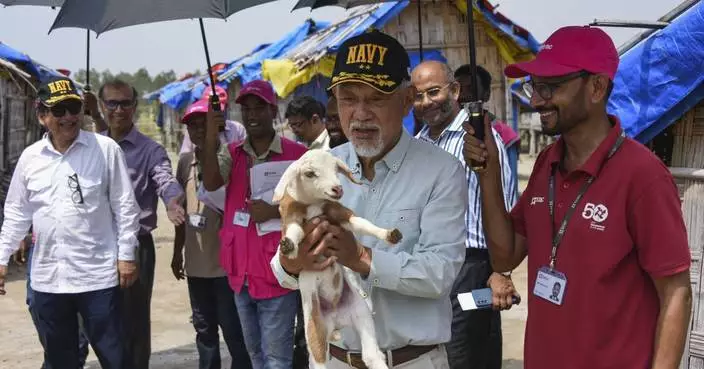Myanmar's civilian leader Aung San Suu Kyi has called the military's investigation into the deaths of Rohingya Muslims found in a mass grave a "positive indication," state media reported Saturday.
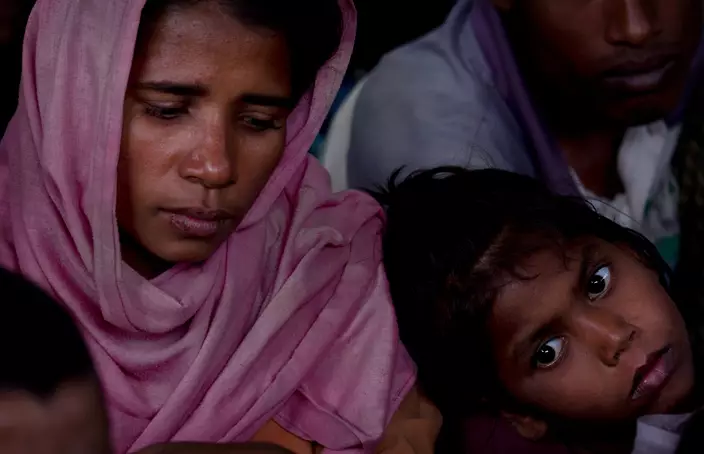
A newly arrived Rohingya family waits at a temporary shelter before their registration at Nayapara refugee camp, some 69 kilometres (43 miles) from in Cox bazar, Bangladesh, Saturday, Jan. 13, 2018. In Rakhine state of Myanmar, government troops have been accused of "ethnic cleansing" that has forced more than 655,000 of Rohingya Muslims to flee into Bangladesh, out of which 60 per cent of the refugees are children. (AP Photo/Manish Swarup)
The military, which has been accused of indiscriminate killings, rape and burning of Rohingyavillages, acknowledged that security forces and villagers were responsible for the deaths of 10 people found in a mass grave in December. It said the 10 were "Bengali terrorists" who had threatened villagers, but that the military would "take action" against those who "broke the rules of engagement."
Click to Gallery
Myanmar's civilian leader Aung San Suu Kyi has called the military's investigation into the deaths of Rohingya Muslims found in a mass grave a "positive indication," state media reported Saturday.
The military, which has been accused of indiscriminate killings, rape and burning of Rohingyavillages, acknowledged that security forces and villagers were responsible for the deaths of 10 people found in a mass grave in December. It said the 10 were "Bengali terrorists" who had threatened villagers, but that the military would "take action" against those who "broke the rules of engagement."
Rohingya men make a temporary shelter at Nayapara refugee camp, some 69 kilometres (43 miles) from in Cox bazar, Bangladesh, Saturday, Jan. 13, 2018. In Rakhine state of Myanmar, government troops have been accused of "ethnic cleansing" that has forced more than 655,000 of Rohingya Muslims to flee into Bangladesh, out of which 60 per cent of the refugees are children. (AP Photo/Manish Swarup)
The government of Buddhist-majority Myanmar does not acknowledge Royingya as a minority group even though they have lived in the country for generations. It says they're immigrants from neighboring Bangladesh. Since August, military operations have driven more than 650,000 Rohingya into refugee camps across the border in Bangladesh.
"It is a positive indication that we are taking the steps to be responsible," Suu Kyi said, according to a report in the Global New Light of Myanmar newspaper. "However, some may worry. But I believe that our investigation will prevent such things from happening again."
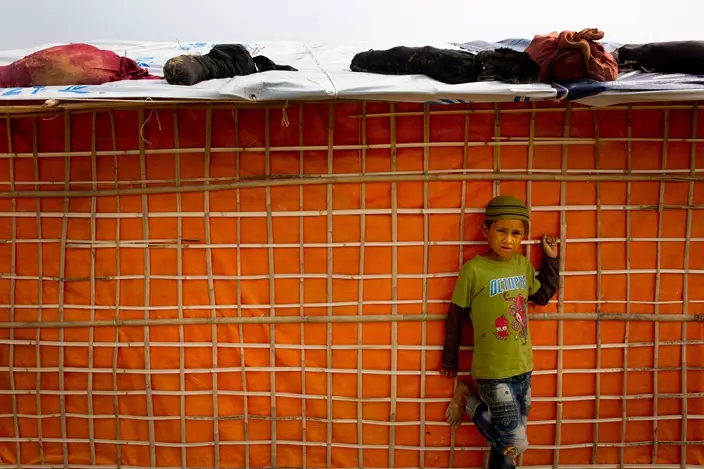
A Rohingya boy leans against the wall of a make shift shelter at Nayapara refugee camp, some 69 kilometres (43 miles) from in Cox bazar, Bangladesh, Saturday, Jan. 13, 2018. In Rakhine state of Myanmar, government troops have been accused of "ethnic cleansing" that has forced more than 655,000 of Rohingya Muslims to flee into Bangladesh, out of which 60 per cent of the refugees are children. (AP Photo/Manish Swarup)
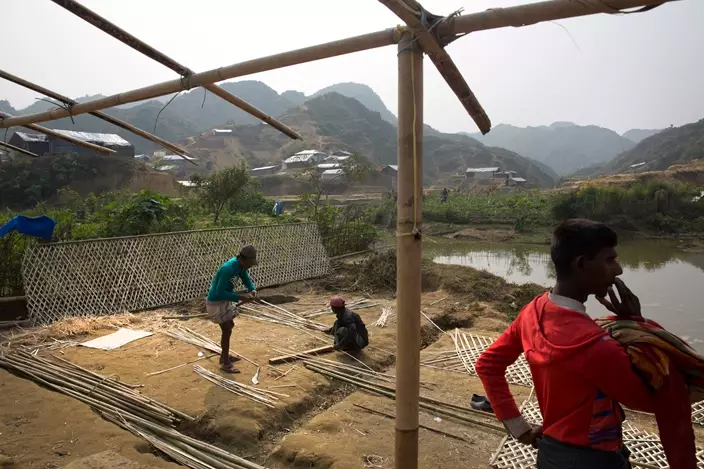
Rohingya men make a temporary shelter at Nayapara refugee camp, some 69 kilometres (43 miles) from in Cox bazar, Bangladesh, Saturday, Jan. 13, 2018. In Rakhine state of Myanmar, government troops have been accused of "ethnic cleansing" that has forced more than 655,000 of Rohingya Muslims to flee into Bangladesh, out of which 60 per cent of the refugees are children. (AP Photo/Manish Swarup)
The government of Buddhist-majority Myanmar does not acknowledge Royingya as a minority group even though they have lived in the country for generations. It says they're immigrants from neighboring Bangladesh. Since August, military operations have driven more than 650,000 Rohingya into refugee camps across the border in Bangladesh.
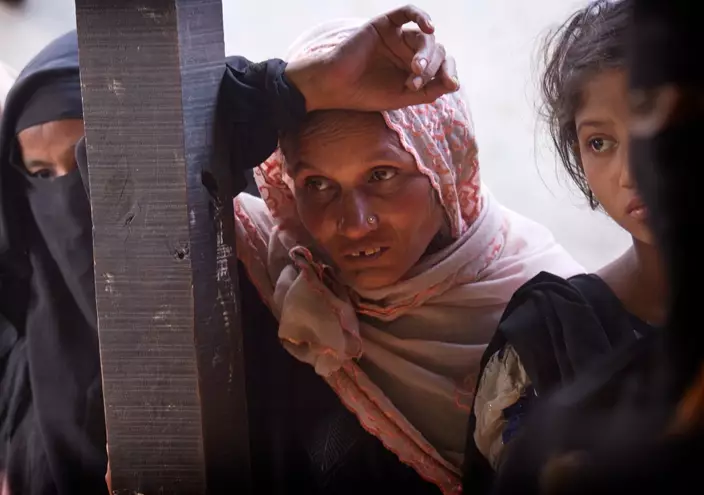
Rohingya women wait in a queue for rations at Nayapara refugee camp, some 69 kilometres (43 miles) from in Cox bazar, Bangladesh, Saturday, Jan. 13, 2018. In Rakhine state of Myanmar, government troops have been accused of "ethnic cleansing" that has forced more than 655,000 of Rohingya Muslims to flee into Bangladesh, out of which 60 per cent of the refugees are children. (AP Photo/Manish Swarup)
"It is a positive indication that we are taking the steps to be responsible," Suu Kyi said, according to a report in the Global New Light of Myanmar newspaper. "However, some may worry. But I believe that our investigation will prevent such things from happening again."
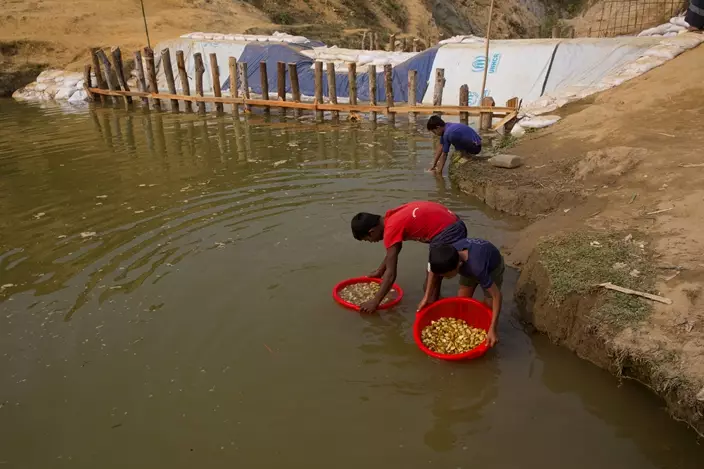
Rohingya boys wash potatoes in a polluted puddle at Nayapara refugee camp, some 69 kilometres (43 miles) from in Cox bazar, Bangladesh, Saturday, Jan. 13, 2018. In Rakhine state of Myanmar, government troops have been accused of "ethnic cleansing" that has forced more than 655,000 of Rohingya Muslims to flee into Bangladesh, out of which 60 per cent of the refugees are children. (AP Photo/Manish Swarup)
Suu Kyi made the comments Friday during a joint news conference with Japan's foreign minister. Suu Kyi is Myanmar's foreign minister as well as the government's civilian leader though the military has a final say in security matters.
Neither the military nor Suu Kyi has said what action will be taken against those responsible for the deaths linked to the mass grave in Rakhine state, where most of the Rohingya live.
BANGKOK (AP) — Myanmar’s military has begun basic training at military bases and schools across the country for draftees called up under the country’s recently activated conscription law, state-run media reported on Tuesday.
The authorities activated the conscription law in February in a bid to to replenish the ranks that have been depleted in nationwide battles against ethnic minority armed groups and armed pro-democracy resistance forces opposed to military rule. The struggle began when the army seized power from the elected government of Aung San Suu Kyi in February 2021.
Over the past five months, the army has lost territory in northern Shan state and in Rakhine state in the west, and is under growing attack elsewhere. It appeared this week that it may also lose the important trading town of Myawaddy, in Kayin state on the border with Thailand.
Opening ceremonies for training were held in various regional commands and military schools in Mon and Shan states and Tanintharyi, Magway and Mandalay regions, as well as in the capital, Naypyitaw, the state-run Myanma Alinn newspaper reported Tuesday.
It said the first batch of trainees were those who voluntarily reported to the army after the military government sent letters summoning them.
The conscription law’s activation has created fear, anxiety and defiance among young people and their parents. Some are leaving the country, while others are fleeing into border areas controlled by ethnic minorities or joining resistance groups.
Independent Myanmar media reported Tuesday that a few young people staged brief protests against conscription at three locations in Yangon, the country’s largest city. The protests on Monday were carried out as flash mobs to evade attacks or arrests by the authorities.
Under the law, men aged 18 to 35 and women 18 to 27 can be drafted into the armed forces for two years. The military has said about 14 million men and women of the total 56 million population of the country are eligible for military service and it will draft 5,000 people at a time and up to 60,000 people a year. Evading conscription is punishable by three to five years in prison and a fine.
Myanmar’s military is also reportedly tapping an unlikely source to fill its depleted ranks, turning to members of the the Muslim Rohingya minority, who seven years ago were the targets of a brutal counterinsurgency campaign incorporating rape and murder that saw an estimated 740,000 flee to neighboring Bangladesh as their villages were burned down.
Analysts say the move is meant not only to counter the army’s attrition though deaths, desertions and defections, but also constitutes a divide and conquers strategy meant to reignite tensions between ethnic groups in Rakhine.
Rohingya have lived especially in Rakhine for generations, but they are not officially recognized as an indigenous ethnic minority, instead being called Bengalis and described as illegal immigrants. They have been denied citizenship and other basic rights including freedom of movement, and are the targets of widespread social discrimination. The U.N. has estimated that 600,000 Rohingya are still living in Myanmar.
The main anti-military resistance force in Rakhine state is the Arakan Army, which is part of the movement seeking greater autonomy for the Rakhine ethnic group that dominates the area. Rakhine nationalists were among the leading persecutors of the Rohingya minority, but now the Arakan Army and the Rohingya have a common enemy in the military government to took power in 2021, making them uneasy allies.
Aung Kyaw Moe, a Rohingya who is deputy minister for human rights in the shadow National Unity Government, said last month that the military is creating a conflict between the Rohingya and Rakhine ethnic groups in hopes of regaining the military advantage in Rakhine.
“The military council is losing the battles nationwide. Especially in Rakhine, military camps are being abandoned almost every day, and the towns controlled by the military council are falling. In Rakhine, the military council is in need of a lot of human resources due to the depletion of the army. It seems that they have calculated that only by creating a conflict between Rakhine and Rohingya can the current situation be changed,” Aung Kyaw Moe said.
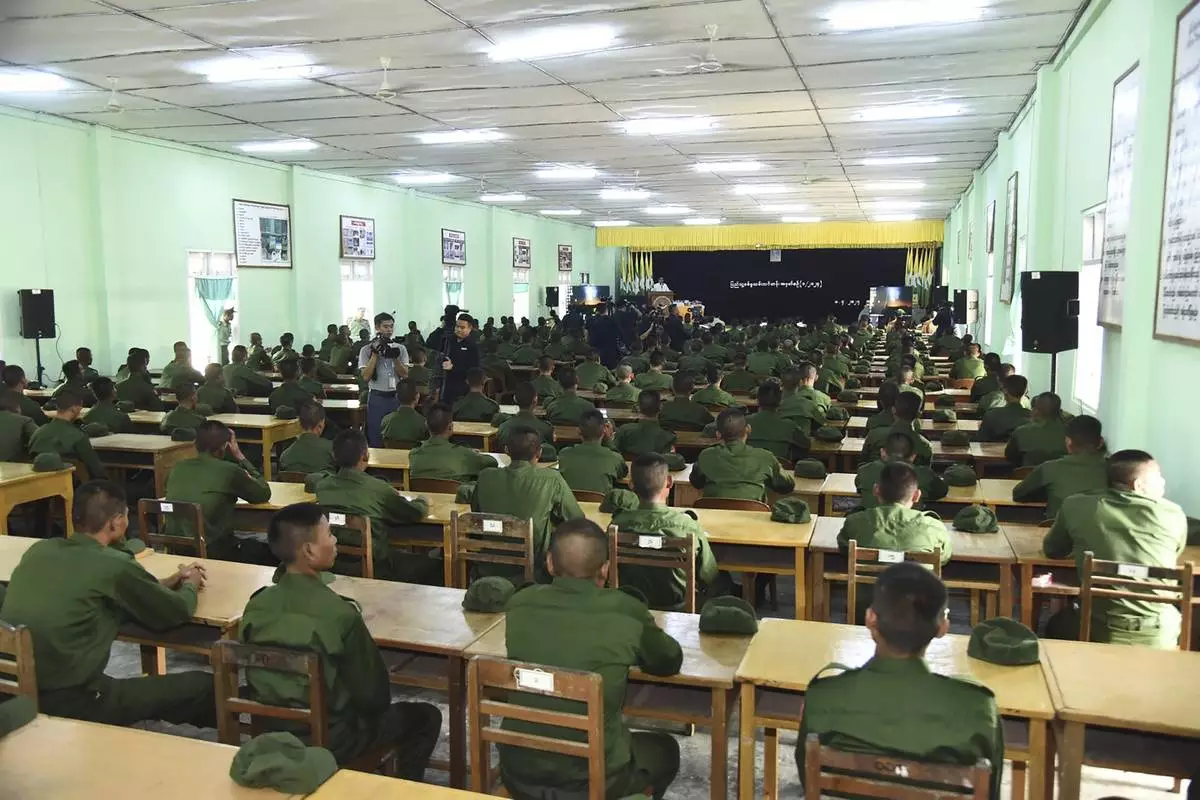
In this undated photo released on April 8, 2024 by The Military True News Information Team, trainees of first batch of military service attend an opening ceremony for their training session at a military compound in Mandalay, Myanmar. Myanmar’s military has begun basic training at military bases and schools across the country for draftees called up under the country’s recently activated conscription law, state-run media reported on Tuesday, April 9.(The Military True News Information Team via AP)
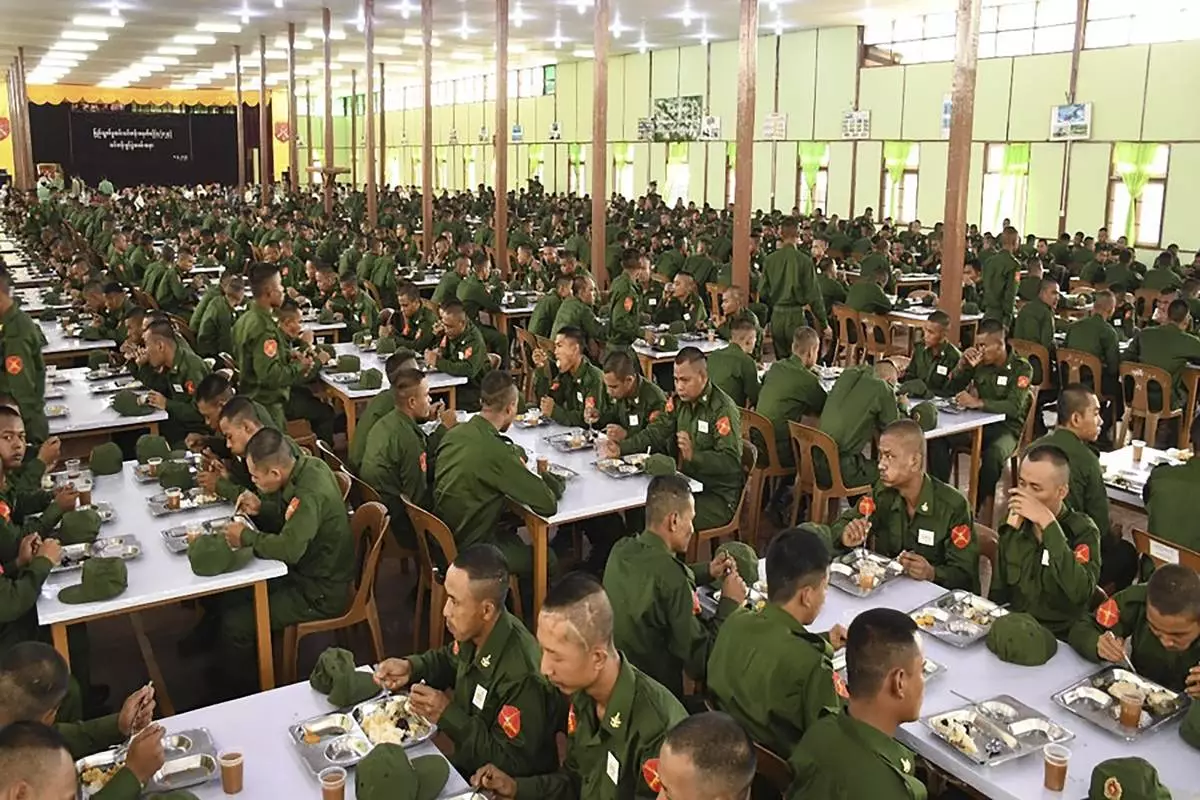
In this undated photo released on April 8, 2024, by The Military True News Information Team, trainees of first batch of military service have meals as an opening ceremony for their training session was held at a military compound in Yangon, Myanmar. Myanmar’s military has begun basic training at military bases and schools across the country for draftees called up under the country’s recently activated conscription law, state-run media reported on Tuesday, April 9.(The Military True News Information Team via AP)
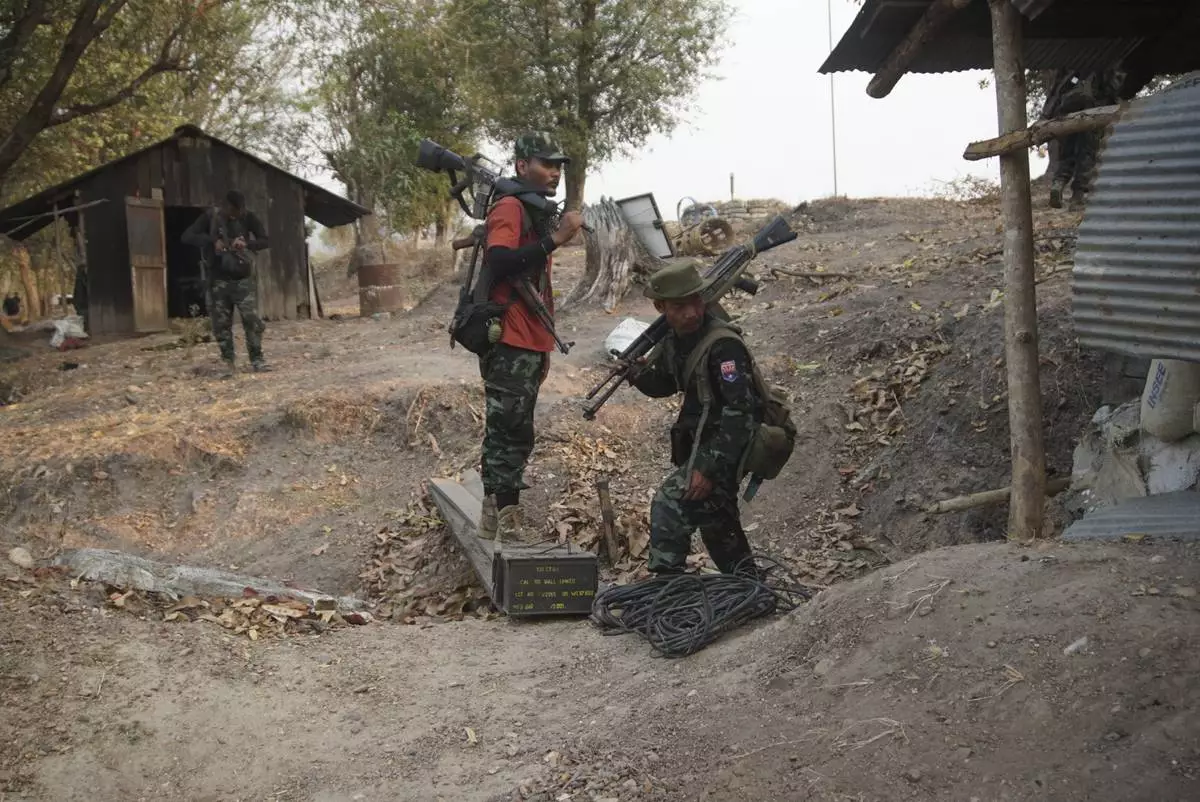
Members of the Karen National Liberation Army and People’s Defense Force collect weapons after they captured an army outpost, in the southern part of Myawaddy township in Kayin state, Myanmar, March 11, 2024. (AP Photo/METRO)
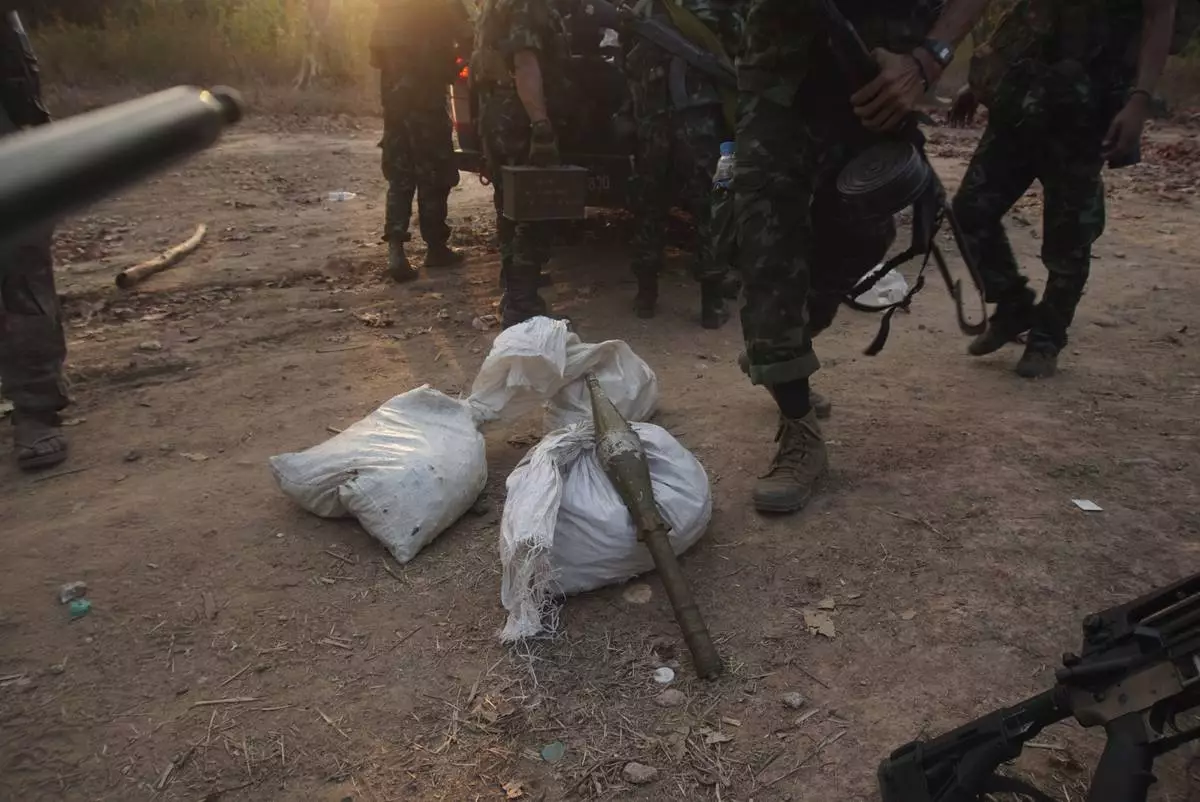
Members of the Karen National Liberation Army and People’s Defense Force collect weapons after they captured an army outpost, in the southern part of Myawaddy township in Kayin state, Myanmar, March 11, 2024. (AP Photo/METRO)
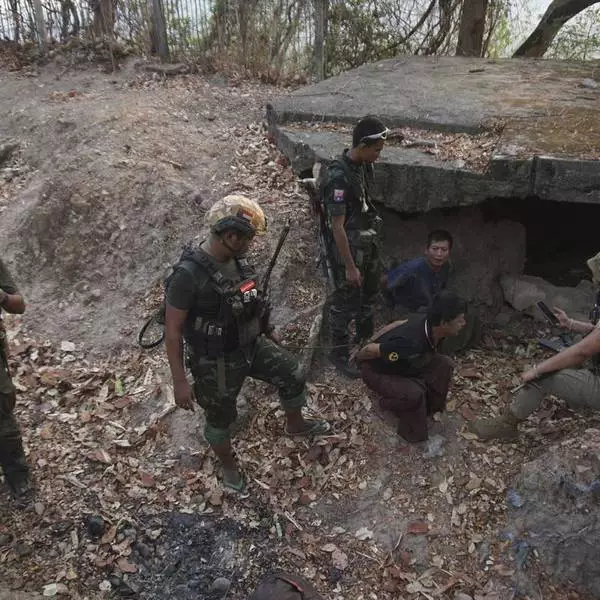
Myanmar military begins basic training for draftees as resistance forces keep the pressure on
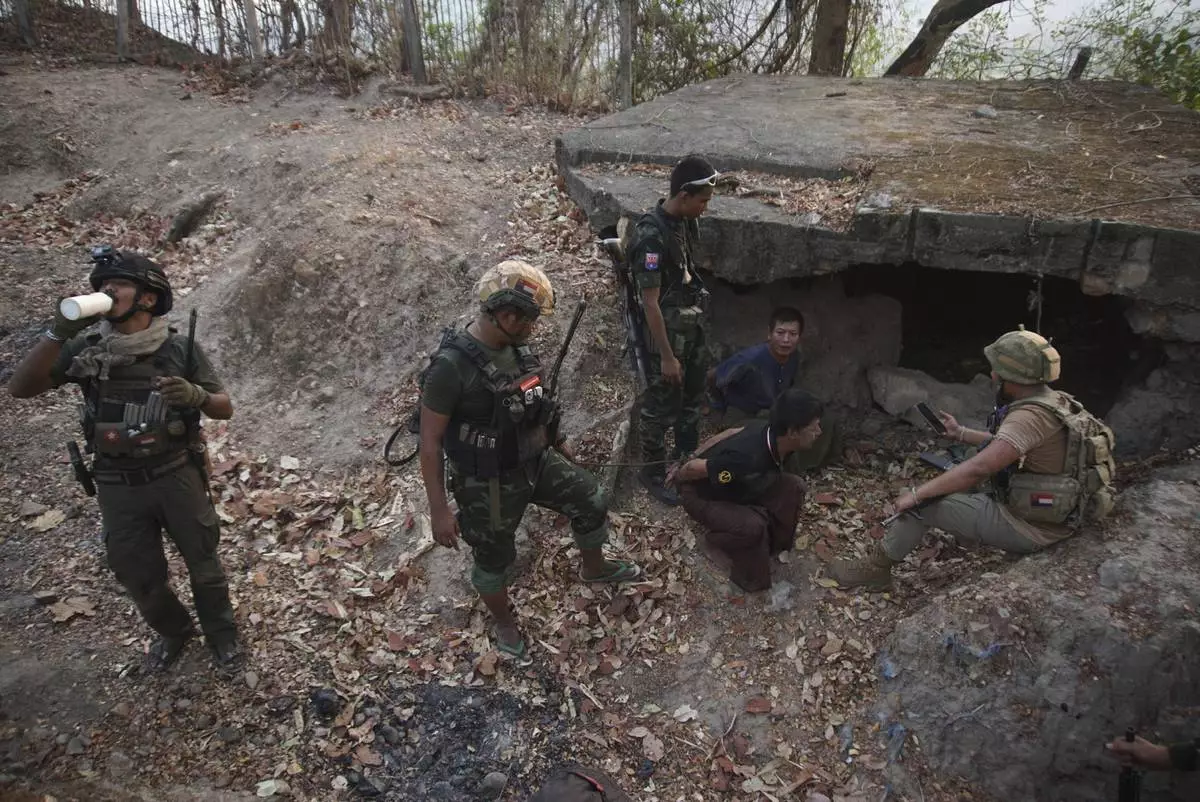
Members of the Karen National Liberation Army and People’s Defense Force examine two arrested soldiers after they captured an army outpost, in the southern part of Myawaddy township in Kayin state, Myanmar, March 11, 2024. (AP Photo/METRO)
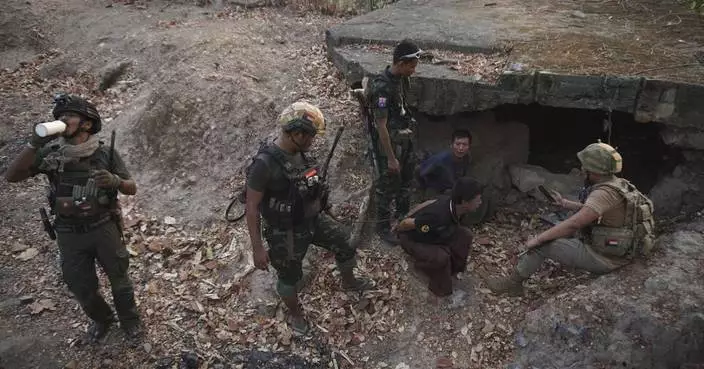
Myanmar military begins basic training for draftees as resistance forces keep the pressure on















